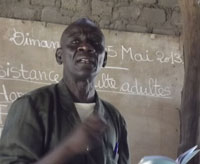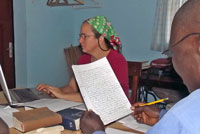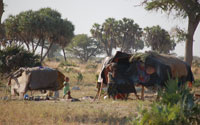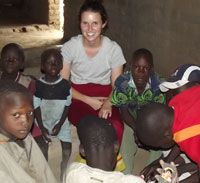
[Home] [Archived news updates and letters]
|
June
28, 2013 Dear
family, friends and supporters; Greetings
again from Chageen. We have been staying healthy and are finding
satisfaction in our labors here in Chad. Hot season has finally ended,
the rains have begun, and Diane’s garden should yield its first
cucumber in a couple days. Meanwhile, we have finished translating the
Gospel of John and 1 Thessalonians and are gearing up to do some more
Psalms before embarking on Ephesians and 2 Thessalonians. We are close
to having completed 50% of the New Testament. Also, we have
enjoyed the company of several guests in our home over the past months,
including our former colleague and new senior director Lorraine Green,
and presently, Karissa Nulty from the U of I for a missions
internship. We hope the following vignettes of our life make for
enjoyable reading and provide food for prayer. Your
fellow servants in Chad, Mark and Diane
|
|
|
In the beginning was the WHAT ???! The
opening lines of the Gospel of John are some of the most profound,
recognizable words of the New Testament: “In the beginning was the
Word, and the Word was with God, and the Word was God…”
But back in January when Mark, Joseph and François began the
translation of John, they took one look at those words, and without
further adieu, skipped straight to verse 19 which begins with the rather
more prosaic statement “This is the testimony of John…” The reason
for their intimidation was that they immediately perceived a monumental
problem: the term for “word” in Kwong means “word” only in the
context of people talking to each other, something which is manifestly
not the case in John chapter 1. In most other places, alas, the term in
question (swa) means… “problem.” So a literal,
word-for-word translation of John 1:1 would be, quite simply, a
blasphemy: “In the beginning was the problem, and the problem was
with God, and the problem was God.” Richard Dawkins would
doubtless have been delighted by such a masterpiece of humanistic
insight, but it would hardly do for the confessing church of Christ. We
came back to these words once we finished the rest of the book. After
studying the various usages of the Greek term “logos” which our
English term “Word” translates, and considering the various options
open to us in the Kwong language, we took a deep breath and made a stab
at the verse as follows: “In the beginning, Him who is named the
Meaning was already there. At that time, he was together with God,
and he was indeed God himself.” The difficult part was, of
course, the term “meaning” which Joseph and François rendered with
a rare Kwong term (gindiddøø) which we weren’t familiar with
but which apparently carries the sense of “root” or “origin.”
When some of the bright young bucks return to the village during the
summer school break, we will test this translation with them and see
whether they in fact understand the phrase the way Joseph and François
intend for it to be understood. Assuming they do (and we are somewhat
sanguine about the prospects of that being the case), then the Wycliffe
translation consultant will also cross-examine the guys on it as a
further level of quality control. Gawking
at the natives The
stereotype of a tourists gawking and taking pictures of “the
natives” is as familiar as it is deserved. Only the Lord knows how
many times we, too, would have loved to take a picture of some of the
more colorful, exotic scenes of Chad, but were restrained from doing so
by the unwritten rules of propriety which govern such things. We are
not, after all, tourists. So you can imagine our surprise and amusement
when Diane and the intern who is with us this summer, Karissa Nulty,
went (without cameras, of course) to see the camp some nomads had set up
near our home and were greeted by a nomad girl who, seizing the occasion
to get a picture of some of the indigenous white women in their native
costumes, whipped out a cell-phone and started taking pictures of Diane
and Karissa. It seems the stereotype is taking on a whole new dimension.
Another
iron in the fire for Diane A
grown Kwong man weeps uncontrollably. After 20 years of estrangement
with his brother, he has finally been reconciled to him, only to be
unwittingly complicit in his untimely death at the hands of incompetent
surgeons at the government hospital during a routine hernia surgery. If
only they had gone the extra 12 miles to the mission hospital. Friends
and neighbors heap accusations on him. He is devastated and feels
hopeless. A
Kwong woman visiting her daughter in another village lashes out in anger
and bites the hand of the young lady who got in a fight with her
daughter. Two days later, as she prepares to return to Chageen to attend
church, her husband takes the opportunity to acidly point out how very
unfit someone who bites another woman must be for spiritual things.
Nevertheless, she makes the two hour trek, but on arriving, is overcome
by exhaustion and guilt. She collapses in a fit of tears and
starts throwing bricks at her own children. These
are but two recent examples of occasions where Diane has been able to
minister to the Kwong as a novice counselor. Additionally, her
missionary colleagues here in Chad have seen her gifting (Mark is
writing this, by the way) and have elected her the Member Care
Coordinator for several years running now. So we jumped at the
invitation for her to attend a well-regarded two-week training workshop
in counseling for missionaries which will be held in Antalya, Turkey in
October. As the workshop organizers prefer couples, and as Mark
wouldn’t mind getting out of Chad for a couple weeks, he will be
attending as well. The organizers have, however, been discretely advised
that he has no gifting in this particular line of work. So he will, at
their suggestion, do “counseling lite” and attend a 3-day
meeting of Team field treasurers (which is another hat Mark wears in
Chad) and which, it turns out, will also be held in Antalya during the
same time. When we told our translators that we would be visiting the
ruins of Ephesus, they wanted to join us and wondered whether they could
maybe ride their bicycles there. We are looking forward to the trip.
● |
Our
translator Joseph has never been to Bible School. He was, however,
recently ordained as a pastor by the national leadership of the
Evangelical Church of Chad on the merits of his many years of doing
Bible translation.
Diane,
Joseph, and François (right) recently finished proofing their
translation of the book of 1 Thessalonians.
A nomad
camp a short distance from our home. (A picture taken, we might add, by
a visitor, not us.)
Karissa
has been a tremendous help in our ministry to Kwong children. She is
applying to medical school. |



